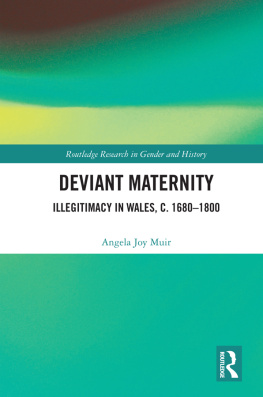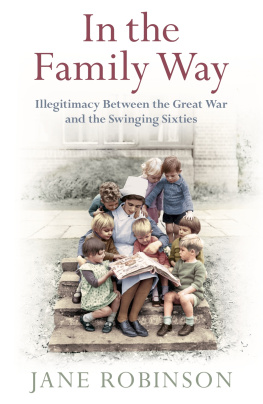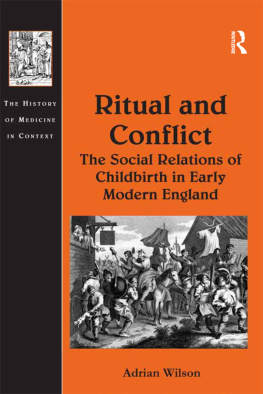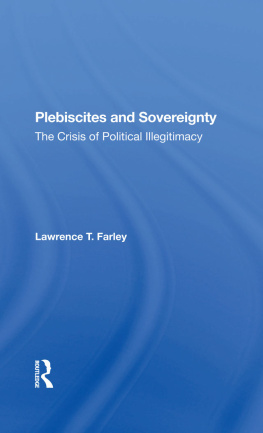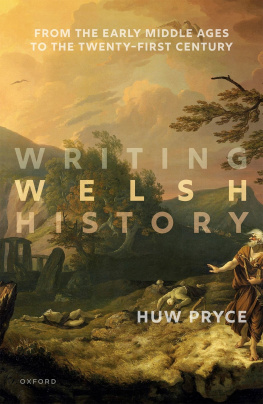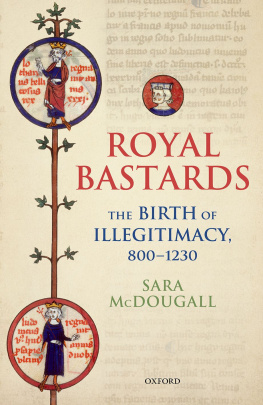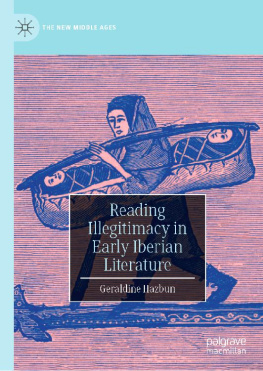Deviant Maternity
This is the first-ever book to explore illegitimacy in Wales during the eighteenth century. Drawing on previously overlooked archival sources, it examines the scope and context of Welsh illegitimacy, and the link between illegitimacy, courtship and economic precarity. It also goes beyond courtship to consider the different identities and relationships of the mothers and fathers of illegitimate children in Wales, and the lived experience of conception, pregnancy and childbirth for unmarried mothers. This book reframes the study of illegitimacy by combining demographic, social and cultural history approaches to emphasise the diversity of experiences, contexts and consequences.
Angela Joy Muir is a Lecturer in British Social and Cultural History at the University of Leicester.
Routledge Research in Gender and History
The Masculine Modern Woman
Pushing Boundaries in the Swedish Popular Media of the 1920s
Jenny Ingemarsdotter
Gendering Spaces in European Towns, 15001914
Edited by Elaine Chalus and Marjo Kaartinen
The Anti-Abortion Campaign in England, 19661989
Olivia Dee
British Women Travellers
Empire and Beyond, 17701870
Edited by Sutapa Dutta
Married Women in Legal Practice
Agency and Norms in the Swedish Realm, 13501450
Charlotte Cederbom
Courtship, Marriage and Marriage Breakdown
Approaches from the History of Emotion
Katie Barclay, Jeffrey Meek and Andrea Thomson
The Impact of World War I on Marriages, Divorces, and Gender Relations in Europe
Edited by Sandra Bre and Saskia Hin
Deviant Maternity
Illegitimacy in Wales, c. 16801800
Angela Joy Muir
For more information about this series, please visit: www.routledge.com/Routledge-Research-in-Gender-and-History/book-series/SE0422
Deviant Maternity
Illegitimacy in Wales, c. 16801800
Angela Joy Muir
First published 2020
by Routledge
52 Vanderbilt Avenue, New York, NY 10017
and by Routledge
2 Park Square, Milton Park, Abingdon, Oxon, OX14 4RN
Routledge is an imprint of the Taylor & Francis Group, an informa business
2020 Taylor & Francis
The right of Angela Joy Muir to be identified as author of this work has been in accordance with sections 77 and 78 of the Copyright, Designs and Patents Act 1988.
All rights reserved. No part of this book may be reprinted or reproduced or utilised in any form or by any electronic, mechanical, or other means, now known or hereafter invented, including photocopying and recording, or in any information storage or retrieval system, without permission in writing from the publishers.
Trademark notice: Product or corporate names may be trademarks or registered trademarks, and are used only for identification and explanation without intent to infringe.
Library of Congress Cataloging-in-Publication Data
Names: Muir, Angela Joy, 1979 author.
Title: Deviant maternity : illegitimacy in Wales, c. 16801800 / Angela Joy Muir.
Description: New York, NY : Routledge, 2020. | Series: Routledge research in gender and history ; 41 | Includes bibliographical references and index.
Identifiers: LCCN 2019055339 (print) | LCCN 2019055340 (ebook) | ISBN 9780367896805 (hardback) | ISBN 9781003020516 (ebook) | ISBN 9781000035018 (adobe pdf) | ISBN 9781000035025 (mobi) | ISBN 9781000035032 (epub)
Subjects: LCSH: IllegitimacyWalesHistory18th century. | Unmarried mothersWalesHistory18th century. | WalesSocial conditions18th century.
Classification: LCC HQ999.G7 .M85 2020 (print) | LCC HQ999.G7 (ebook) | DDC 306.87409429dc23
LC record available at https://lccn.loc.gov/2019055339
LC ebook record available at https://lccn.loc.gov/2019055340
ISBN: 978-0-367-89680-5 (hbk)
ISBN: 978-1-003-02051-6 (ebk)
Typeset in Sabon
by Apex CoVantage, LLC
For my family.
I fy nheulu, fy hoff bastardiaid bach. Diolch o galon am bopeth. Dwin caru chi.
Contents
PART I
Prevalence and Causes
PART II
The Mortality Penalty
PART III
The Experience of Pregnancy and Childbirth for Unmarried Mothers
Guide
This book started as a PhD project in 2014 with funding from the Wellcome Trust and Social Sciences and Humanities Research Council of Canada. With the support from the Institution for Historical Research in the form of an Economic History Society Power Postdoctoral Fellowship, it became a book. The research that went into these pages was carried out at during my time at the University of Exeter, Cardiff University and the University of Leicester, and would not have been possible without these studentships and fellowship.
Research that spans five years and three institutions inevitably leads to a lengthy list of people who are due thanks. First and foremost, I would like to express my sincere gratitude to my doctoral supervisors, Sarah Toulalan and Alun Withey, for their support, guidance and encouragement. A better supervisory team certainly cannot exist. I am also eternally grateful for the comradery of those with whom I had the pleasure of sharing the proverbial PhD trenches, including Emily Bridger, Tom Chadwick, Hannah Charnock, Fred Cooper, Natasha Feiner, Anna Jackman, Simon Mackley, Charmian Mansell, Sharanya Murali, Josh Rhodes, Jon Venn, Michelle Webb and many others. Thank you for the lively, impassioned and thought-provoking debates, as well as the collegiality and friendship that was fostered over many, many hours in the pub.
This books evolution from a thesis to a monograph began with the support of friends and colleagues in Cardiff. I am indebted to Lloyd Bowen, Emily Cock, David Doddington, Derek Dunn, Rachel Herrmann, Bronach Kane, Jan Machielsen, Gavin Murray-Miller, Kevin Passmore, James Ryan, David Selway, Lara Taffer, Shaun Tougher, Keir Waddington, Garthine Walker, Steph Ward and Mark Williams. An extra special thanks also goes to Mary Heimann for her steadfast confidence and support, and her supply of wine and limoncello. The friendship and support of these colleagues during an otherwise precarious year as an early career researcher has left a deep impression on me.
The finishing touches of this book took place during my first year at the University of Leicester. In addition to being grateful for securing the unicorn that is a permanent job in academic, I am also thankful to Sarah Goldsmith, Zo Groves, Zo Knox, Roey Sweet, Deborah Toner, Richard Butler and Alistair Kefford for their support and collegiality. To the rest of my colleagues in the Centre for English Local History and School of History, Politics and International Relations, I thank you en masse to avoid making these acknowledgements read any more like an Oscar speech than they already do.
My gratitude must also be extended to the staff of the various archives offices I visited over the course of this research, including Flintshire Record Office, Denbighshire Archives Office, Pembrokeshire Record Office, Herefordshire Archive and Records Centre, Shropshire Archives, Greater Manchester County Record Office and The National Archives. Extra thanks go to the staff at Powys County Archives and the National Library of Wales for their expertise and patience in answering my countless queries and fulfilling my endless requests. Special thanks to Anna Brueton for allowing me to incorporate the data she collected and analysed for her study of illegitimacy in Wales, which predates my own.

